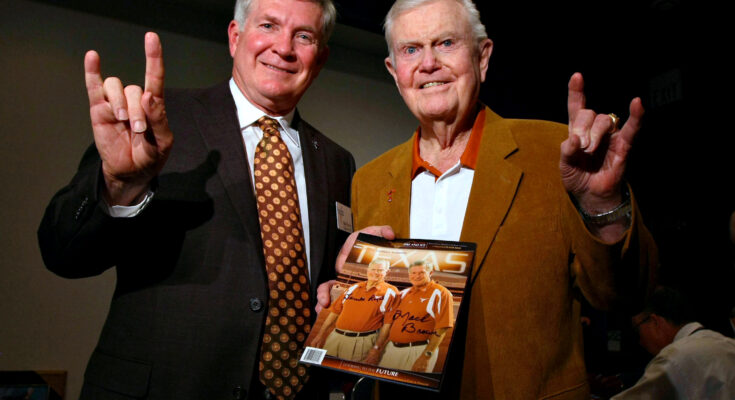Darrell K. Royal’s 20-year tenure (1957–1976) as the head coach of the University of Texas was nothing short of transformational. Arriving after a dismal 1–9 season, Royal revitalized the Longhorns into a perennial powerhouse. In his first season, the team bounced back to 6–3–1 and earned a Sugar Bowl invitation(si.com). That marked the beginning of a legacy defined by unwavering excellence—Royal never coached a losing season across his entire collegiate career, including stops at Mississippi State and Washington(en.wikipedia.org).
Over those two decades, Royal compiled an astounding 167–47–5 record at Texas(texaslonghorns.com). His teams captured 11 Southwest Conference titles and appeared in 16 bowl games, winning ten of them(texaslonghorns.com). His résumé boasts three national championships (1963, 1969, 1970), including the famed undefeated seasons of ’63 and ’69 and a co-title in ’70(texaslonghorns.com). The 1969 victory over Arkansas, labeled the “Game of the Century” by ABC, ended in a dramatic 15–14 triumph that left a lasting imprint(washingtontimes.com).
Royal was more than just a winner of football games; he was a true innovator. A disciplined fundamentalist who preached that “football games are decided from the twenty‑yard line on in… all that other running and panting…is just entertaining spectators and wearing out grass,” Royal emphasized smart execution over flash(news.utexas.edu). He brought pioneering changes to the collegiate landscape—one of the first coaches to employ a full-time academic counselor for athletes and instituted the cherished “T” ring awarded upon graduation(bustin.com).
On the tactical front, Royal implemented what became known as the “flip‑flop Winged‑T” formation in 1962, which propelled the Longhorns to their first era-defining triumph in 1963(cfbhall.com). But his most lasting contribution came in 1968 with the introduction of the wishbone offense, thanks to offensive coordinator Emory Bellard. The three‑back, option‑based setup revolutionized college football. Between 1968 and 1970, Texas dominated defensively and offensively, averaging well over 300 rushing yards per game and stringing together a 30-game winning streak(mountbonnell.info). This approach was so effective that legendary coaches like Paul “Bear” Bryant adopted it at programs such as Alabama.
Royal’s approachability, calm demeanor, and ethics set him apart. Players and peers alike recall that he never raised his voice or displayed anger. His integrity was lauded; he demanded ethical behavior from his players and himself. “I want to be remembered as a winning coach but … as an honest and ethical coach,” he often stated(news.utexas.edu).
Beyond wins and formations, Royal shaped lives. He coached 37 All‑Americans, saw six players earn NCAA postgraduate scholarships, and watched 61 players drafted into the NFL, eight in the first round(texaslonghorns.com). He emphasized character, education, and post‑football success for all his players.
Royal’s influence extended into administration: he served as Texas’ athletic director from 1962 to 1980. His administrative leadership helped define the university’s athletic direction, including hiring Mack Brown as head coach in 1997(washingtontimes.com, espn.com). The university honored him in 1996 by renaming the stadium Darrell K Royal–Texas Memorial Stadium—a testament to his transformative impact(washingtontimes.com).
Off the field, Royal was a beloved public figure. He had deep friendships with influential figures, including President Lyndon B. Johnson, who called him “the rarest of human beings”(espn.com). He maintained patience through societal pressures, notably on integration—while Texas did not field Black players until 1970, Royal acknowledged the delay and its political constraints(wbur.org). He and his wife later supported an Alzheimer’s research fund and remained engaged in the community.
Royal’s character and legend extended into storytelling. He authored an autobiography and scrapbook (“Coach Royal”) and remained the straight-shooter fans remembered—tough, kind, and unpretentious(briscoecenter.org).
His legacy remains everywhere at Texas: from the stadium that bears his name, to the traditions he established, to the culture of excellence he instilled. He set a blueprint for college football coaching—combining winning strategies, academic focus, integrity, and community commitment.
Even years after his passing at age 88 in 2012 from complications of Alzheimer’s and cardiovascular disease, Royal is remembered as a coaching giant, a moral standard-bearer, and an innovator who reshaped the sport(reportingtexas.com). Darrell Royal didn’t just coach football—he built a legacy of excellence and honor that continues to define Texas athletics.



